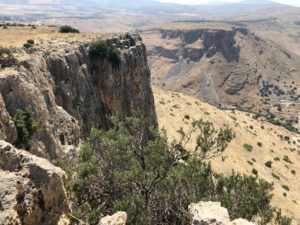This third podcast (12 mins) from the Beatitudes focuses on the important—yet undervalued—quality of meekness.
Click on the arrow to play the podcast, or you can use the "download" icon to download the podcast (if available). You can also right click here, in order to save the audio file and listen later.
“Blessed are the meek, for they shall inherit the earth." (Matthew 5:5)
- "Meek" is a word we seldom use. It does not mean "weak."
- It derives from the Old Norse mjúkr, meaning soft, pliant, gentle.
- Oxford English Dictionary:
- Gentle, courteous, kind; merciful, indulgent.
- Free from self-will; piously humble and submissive; patient and unresentful.
- In physical applications: Not violent or strong; gentle.
What does meekness look like?
- Take a look at Mary in Luke 10:38-42.
- Early church: “You shall be meek, since ‘the meek shall inherit the earth.’ Be long-suffering, merciful, guileless, gentle and good. Always tremble at the instruction which you have heard. You shall not exalt yourself, nor let your soul get over-confident. Do not join your soul with the lofty ones. Rather, let it associate with the righteous and lowly.” Didache 7-9 (ANF 7.378), sometime close to the year 100 AD.
- The ultimate example of meekness was Jesus. He invited His followers with these words: “Take my yoke upon you and learn from me; for I am meek and lowly in heart, and you will find rest for your souls” (Matthew 11:29).
Not weak!
- Some have the mistaken notion that a meek person is timid, dull, and non-assertive.
- However, Jesus, who set the standard for meekness, was none of those things. He demonstrated that a person can be bold and assertive and yet also be meek and lowly.
“Inherit the earth”?
- What did Jesus mean?
- Throughout history, the meek have often been deprived of their homes, lands, and other possessions by the wicked and powerful. So the inheritance must be in the next age, not this one.
- Earth = land in Hebrew—often referring to the land of Israel.
- We, however, understand the earth to be a planet—in essence, our world.
- So, the righteous will receive this inheritance at the resurrection (2 Peter 3:13-14).
Application
- Don’t respond to frustration with force—physical or verbal brutality.
- Don’t return violence with violence—big implications for politics, journalism, military might, and more.
- Beware forceful, charismatic leaders. We need to learn to admire the quiet person who is godly. And learn to reject most of role models of the world.
- As we read through the gospels, try to notice the qualities of Jesus encapsulated in the Beatitudes (mourning, meekness, peacemaking, and so forth). He is the one we aim to emulate (Eph 5:1; 1 Cor 11:1).
Next: Hunger and thirst for righteousness (Matt 5:6)









